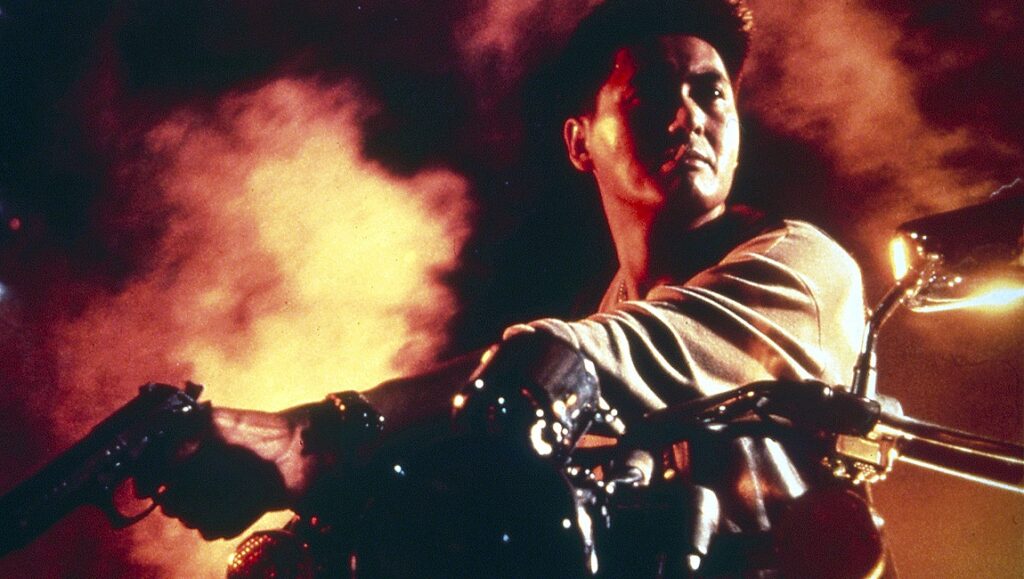It’s the stuff of a million shoddy programmers from Hollywood’s golden age and twice as many cheap exploitation films from the heydays of the ’70s, ’80s, and ’90s: a tough yet honest man gets roped into a heist to help his friend, only to get double-crossed and left for dead. Miraculously, he survives and rides back into town with vengeance on his mind. If there’s a tough-guy star who hasn’t swaggered through these plot mechanics, he probably isn’t really tough. It’s a marvel that audiences can still enjoy sitting through something so predictable, yet in Ringo Lam’s Full Contact, it’s the simplicity of the clichés which allow for a wholly invigorating experience. Lam deploys these well-worn plot machinations as if he was reciting a mantra, letting the repetition of already familiar tropes guide the film toward an almost spiritual ideal of pure sensation and style.
Coming after Lam’s On Fire series of films, which garnered political controversy for their bleak, critical views of society, Full Contact was an attempt on Lam’s part to make something removed from politics. Where City on Fire heavily features an almost documentary view of Hong Kong streets and the working life of criminals, Full Contact is a film whose settings and characters have a deliberate unspecificity. A loud nightclub with pulsing strobe lights; a plethora of smoke-filled bridges and tunnels; an always quarreling bad-guy couple composed of one dumb musclehead and a nymphomaniac seductress — if you haven’t seen them before then you haven’t been to the movies. Even the film’s hero, Jeff (Chow Yun-Fat), is easily summed up as a pinnacle of ’90s masculine cool. His motorbike, leather jacket, high-top haircut, and cocky-but-cool demeanor are all tropes, and they define him much more than any of the character relationships or, even, the emotional weight of the betrayal he faces from his best friend, Sam (Anthony Wong).
Released the same year as John Woo’s Hard Boiled, Full Contact can be viewed, alongside that film, as an epitome of the heroic bloodshed genre. But unlike Woo’s attempt to take the melodrama of masculine betrayal to ever increasing depth, Lam distills the generic template to its basics and deploys its tropes as if they were pieces of myth. There’s something eternal about Jeff’s reincarnation and singular-minded drive for vengeance, and Lam reinforces this by leaning heavily on elemental motifs to frame much of the action. Water and fire appear throughout the movie, with the former being closely associated with Jeff and his quest for purity through violence — at two different points a hard rain comes to literally wash the blood off his hands — and the latter often deployed by the villains as a tool to kill the innocent. Even when these elements aren’t directly involved in a scene, the lighting often bathes Jeff in marine blue light, regardless of whether there is any diegetic motivation for the color. Lam treats the characters and story events as axiomatic, giving them the attendant force of something eternal.
With characters that exemplify images and types, with political and moral depth deliberately eschewed, this is truly a world of physical sensations, and it’s appropriate that one of the film’s primary thematic concerns is sex. Physical desire and these characters’ insatiable libidos define them to an astounding degree. Everyone, with the exception of Jeff, is always out to seduce each other. That Jeff is above these games of seduction and desire would seem to put him on another, more spiritual plane than the film’s bad guys. When he yells to Judge (Simon Yam) “Go masturbate in hell” as he deals him a deathblow at the end of the film, we understand it to be a sentence to a purgatory of pure physicality.
Part of Kicking the Canon – The Film Canon.


Comments are closed.